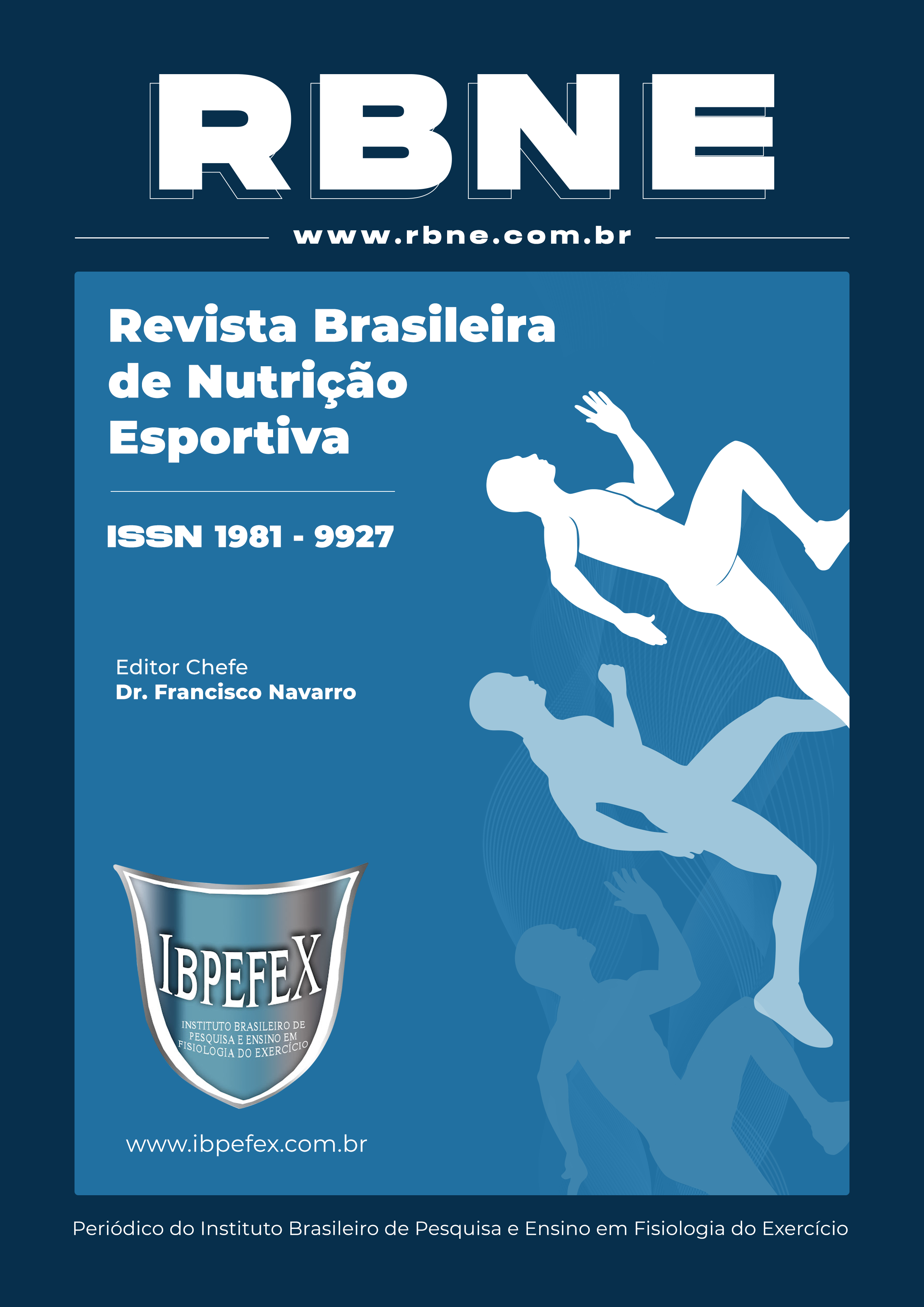Effects of creatine supplementation on physical performance of parathletes
Abstract
The parathletes have metabolic and physiological peculiarities. These individuals must have dietary and dietary supplement prescriptions made with care. Given this, nutritional prescriptions for athletes should not be reproduced for para-athletes, as they may not be safe or adequate. Creatine is a proven ergogenic dietary supplement in multiple populations. For parathletes, robust evidence is needed due to individuality in relation to the location and type of injury, which generate different metabolic and physiological responses. Thus, the objective of the present study is to synthesize the results about the effects of creatine supplementation in parathletes on sports performance, as well as the supplementation protocol. The study is a narrative review on the effects of creatine supplementation on sports performance in parathletes. Searches were carried out in databases using keywords and inclusion and exclusion criteria. After identification, there was a screening and reading of the completeness of the studies found for qualitative analysis. Most of the studies appreciated that the use of creatine in the dosage of 5 to 20 grams of creatine for eight weeks or the supplementation of 20 grams per day for seven days resulted in better performance for parathletes. The only study that did not affect changes in variables presented biologically plausible justification for this result. Creatine supplementation in parathletes improved performance, mainly resistance and strength, both in acute and chronic use, which also proved to be safe with dosages between 5 and 20 grams.
References
-Amorim, S.; Teixeira, V.H.; Corredeira, R.; Cunha, M.; Maia, B.; Magalho, P.; Pires, J. Creatine or vitamin D supplementation in individuals with a spinal cord injury undergoing resistance training: A double-blinded, randomized pilot trial. The Journal of Spinal Cord Medicine. Vol. 41. Num. 4. 2018. p. 471-478.
-Barboza, R.R. Silva, T.A.L.; Rêgo, J.T.P.; Medeiros, J.A.; Spina, M.A.; Dantas, P.M.S. Influência do consumo alimentar e uso de suplementos no desempenho de paratletas brasileiros. Revista Brasileira de Medicina do Esporte. Vol. 21. Num. 5. 2015. p. 376-380.
-Bemben, M.G.; Lamont, H.S. Creatine Supplementation and Exercise Performance. Sports Medicine. Vol. 35. Num. 2. 2005. p. 107-125.
-Butts, J.; Jacobs, B.; Silvis, M. Creatine Use in Sports. Sports Health: A Multidisciplinary Approach. Vol. 10. Num. 1. 2017. p. 31-34.
-Comitê Paralímpico Brasileiro. Academia Paralímpica Brasileira. Guia de suplementação nutricional no esporte paralímpico. São Paulo. 2013.
-Corrêa, D.C.; Moreira, I.; Resende, R.; Andrade, A.G.; Silva, A.; Mello, M.T.; Longhi, R.; Gonçalves, D.A. Potenciais efeitos deletérios de dietas restritivas nas respostas endócrino-metabólicas, composição corporal e desempenho físico de atletas com lesão medular espinhal. Revista Brasileira de Nutrição Esportiva. São Paulo. Vol. 16. Num. 97. 2022. p. 180-196.
-Jacobs, P.L.; Mahoney, E.T.; Cohn, K.A.; Sheradsky, L.F.; Green, B.A. Oral creatine supplementation enhances upper extremity work capacity in persons with cervical-level spinal cord injury. Archives of Physical Medicine and Rehabilitation. Vol. 83. Num. 1. 2002. p. 19-23.
-Kreider, R.B.; Kalman, D.S.; Antonio, J.; Ziegenfuss, T.N.; Wildman, R.; Collins, R.; Candow, D.G.; Kleiner, S.M.; Almada, A.L.; Lopez, H.L. International Society of Sports Nutrition position stand: safety and efficacy of creatine supplementation in exercise, sport, and medicine. Journal of the International Society of Sports Nutrition. Vol. 14. Num. 1. 2017. p.14-18
-Madden, R.F.; Shearer, J.; Legg, D.; Parnell, J.A. Evaluation of Dietary Supplement Use in Wheelchair Rugby Athletes. Nutrients. Vol. 10. Num. 12. 2018. p. 1958.
-Magnuson, B.; Peppard, A.; Flomenhoft, D.A. Hypocaloric Considerations in Patients with Potentially Hypometabolic Disease States. Nutrition in Clinical Practice. Vol. 26. Num. 3. 2011. p. 253-260.
-Perret, C.; Mueller, G.; Knecht, H. Influence of creatine supplementation on 800 m wheelchair performance: a pilot study. Spinal Cord. Vol. 44. Num. 5. 2005. p. 275-279.
-Sampaio, C.R.S.F.; Aidar, F.J.; Ferreira, A.R.P.; Santos, J.L.; Marçal, A.C.; Matos, D.G.; Souza, R.F.; Moreira, O.C.; Guerra, I.; Filho, J.F.; Marcucci-Barbosa, L.S.; Nunes-Silva, A.; Almeida-Neto, P.F.; Cabral, B.G.A.T.; Reis, V.C. Can Creatine Supplementation Interfere with Muscle Strength and Fatigue in Brazilian National Level Paralympic Powerlifting? Nutrients. Vol. 12. Num. 2492. 2020.
-Shaw, K. A.; Zello, G.A.; Bandy, B.; Ko, J.; Bertrand, L.; Chilibeck, P.D. Dietary Supplementation for Para-Athletes: A Systematic Review. Nutrients. Vol. 13. Num. 6. 2021. p. 2016.
-Wang, C.C.; Fang, C.C.; Lee, Y.H.; Yang, M.T.; Chan, K.H. Effects of 4-Week Creatine Supplementation Combined with Complex Training on Muscle Damage and Sport Performance. Nutrients. Vol. 10. Num. 11. 2018. p. 1640.
-Wax, B.; Kerksick, C.M.; Jagim, A.R.; Mayo, J.J.; Lyons, B.C.; Kreider, R.B. Creatine for Exercise and Sports Performance, with Recovery Considerations for Healthy Populations. Nutrients. Vol. 13. Num. 6. 2021. p. 1915.
Copyright (c) 2023 Ana Clara Neville Armond Santos, Caio Eduardo Gonçalves Reis, Rafael Longhi

This work is licensed under a Creative Commons Attribution-NonCommercial 4.0 International License.
Authors who publish in this journal agree to the following terms:
- Authors retain the copyright and grant the journal the right of first publication, with work simultaneously licensed under the Creative Commons Attribution License BY-NC which allows the sharing of the work with acknowledgment of the authorship of the work and initial publication in this journal.
- Authors are authorized to enter into additional contracts separately for non-exclusive distribution of the version of the work published in this journal (eg, publishing in institutional repository or book chapter), with acknowledgment of authorship and initial publication in this journal.
- Authors are allowed and encouraged to post and distribute their work online (eg, in institutional repositories or on their personal page) at any point before or during the editorial process, as this can bring about productive change as well as increase impact and impact. citation of published work (See The Effect of Free Access).






